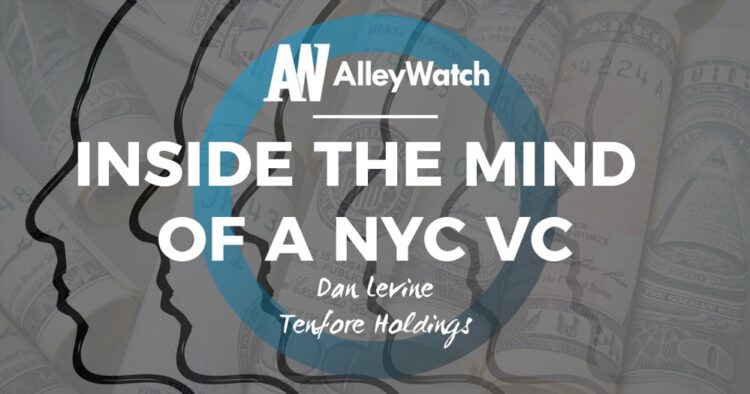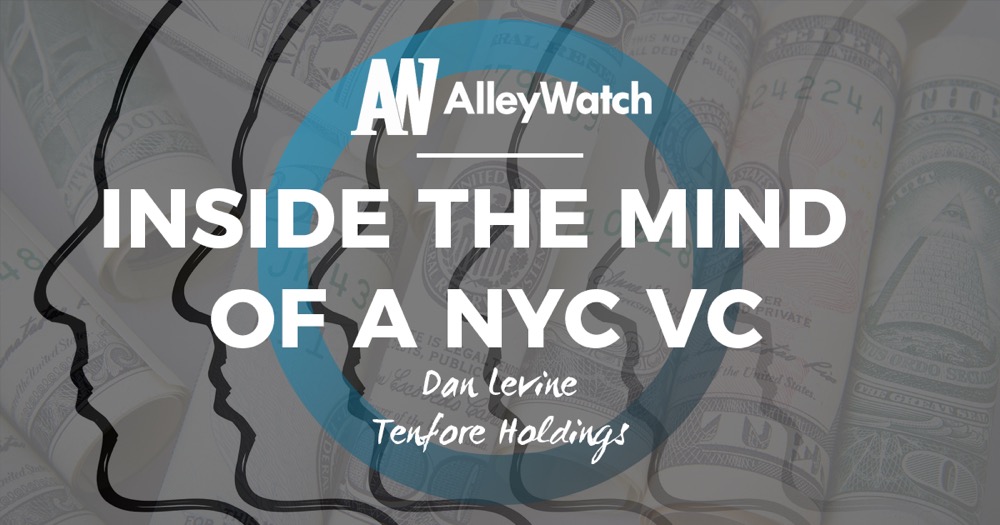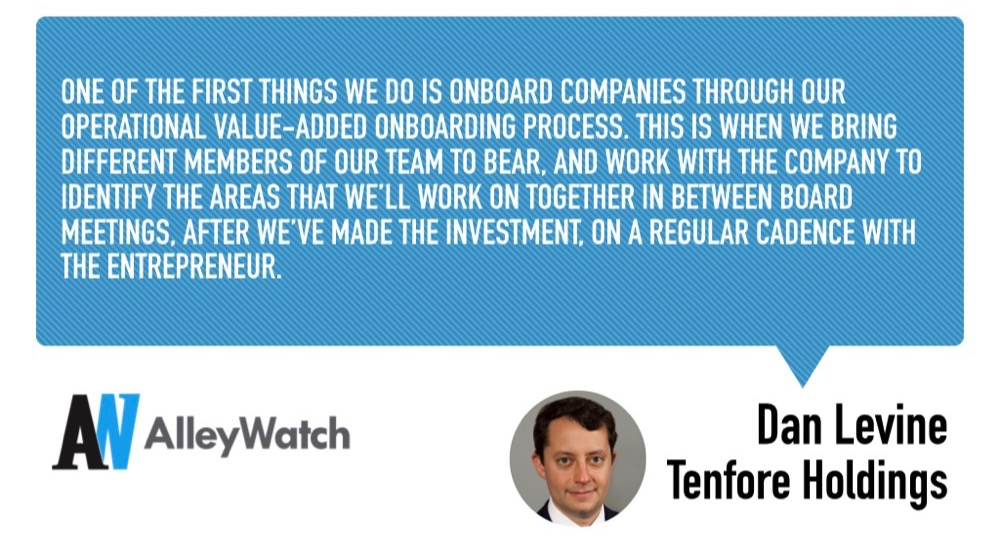Welcome back to Inside the Mind of an NYC VC, a highly acclaimed series at AlleyWatch in which we speak with New York City-based Venture Capitalists. In the hot seat today is Dan Levine, Managing Partner at Tenfore Holdings, an opportunistic, stage agnostic venture firm focused on investments where there is a differentiating and defensible commerce or data component. Currently investing out of its first fund, names in the Tenfore portfolio encompass an array of industries and include startups like GameChanger Media (acquired by Dick’s), Trulioo, Aperia Technologies, Inspire, and Humatics.
Levine launched Tenfore after working closely with Eddie Lampert for several years, developing a number of startup businesses within the Sears Holdings umbrella. Dan was kind enough to join us in our offices in Soho for a candid and insightful conversation to chat more about Tenfore, the operational value that Tenfore brings to its portfolio beyond capital, building businesses that are meant to last, insightful advice for entrepreneurs that are fundraising, and much more… Both Tenfore and Dan maintain a very limited online presence, so it was a real pleasure for us to really get inside the mind of this extremely sharp NYC VC!
If you are a NYC-based VC interested in participating in this series, please send us an email. We’d love to chat. If you are interested in sponsoring this series that showcases the leading minds in venture in NYC, we’d also love to chat. Send us a note
Reza Chowdhury, AlleyWatch: Please tell us a little bit about your background and how you started in venture.
Dan Levine, Tenfore Holdings: I spent several years overseeing, developing, and operating core and startup businesses, so a lot of my background is operational—and the same is true for our team. Companies don’t always have all the in-house experience they need yet, so they’re often looking for operational value-added help. This is one way we’ve been able to differentiate ourselves.
Private technology companies have a tremendous ability to disrupt and fix real-world problems. As I look ahead, I believe we’re going to see an innovation boom in certain areas—these new ideas and solutions are proving to be really attractive ways to invest.
Tell us more about your operational experience and what you worked on and how that has impacted Tenfore Holdings, if at all.
I had the opportunity to work in multichannel retail and leverage and link online, store, supply chain, pricing, inventory, merchandising, and analytics systems. This experience really helped me learn to see both the forest and the trees. Ultimately, being able to have that bigger picture in mind connected to underlying execution while we’ve grown Tenfore has been key to our approach.
Tell us more about Tenfore Holdings. The firm has maintained a pretty stealthy internet presence. What are the types of investments that you look at?
We’re really opportunistic, and we’ve invested across stages. Going in, we like to understand the capital needs of a given business and figure out from there what transaction size makes sense, but some of our recent rounds have ranged from $6-28M.
Is there a specific investment thesis that Tenfore Holdings deploys? Where is the firm’s sweet spot?
We tend to focus on commerce and data. The data focus has taken us to many different industries—including healthcare, agriculture, cybersecurity, and sports statistics, to name a few. These companies all look different superficially, but at their core, there is a common business model of defensible and monetizable data. These unique data aspects are what really stand out to us.
We tend to focus on commerce and data. The data focus has taken us to many different industries—including healthcare, agriculture, cybersecurity, and sports statistics, to name a few. These companies all look different superficially, but at their core, there is a common business model of defensible and monetizable data. These unique data aspects are what really stand out to us.
How does the firm approach deal sourcing?
We find opportunities to invest in three ways: referrals from other investors, referrals from entrepreneurs we’ve worked with, and based on our own research.
In all cases, we’re looking to work with business-builders, who in turn see us that way. From there, it’s about planning who’s around the table—at the board and the management team level—to increase the chances of success in the company.
Tenfore really digs down and gets involved in companies from an operational standpoint. Walk us through some of the ways where the firm is able to offer operational value to portfolio companies? How is Tenfore Holdings a value-add investor?
This is something that really varies for each company and what they need in terms of support. It can range from helping with the financials—whether that be rationalizing the budgeting process or helping to professionalize financial planning and spending. It can also mean making introductions between the company and potential new customers, new investment leads, or future hires. We also advise on broader issues like commercial strategy and deals, and will set up standing calls to act as a sounding board for new ideas.
We’re really open to playing whatever role needs to be filled with the company, and love to be hands on—a lot of our entrepreneurs see us as an extension of their own executive team.
With such a deep operational background, what do you do to ensure that you are also wearing the investor hat?
One of the first things we do is onboard companies through our Operational Value-Added Onboarding Process. This is when we bring different members of our team to bear, and work with the company to identify the areas that we’ll work on together in between board meetings, after we’ve made the investment, on a regular cadence with the entrepreneur.
In my opinion, investing and operating are complementary. Warren Buffett, for example, has talked about how being an operator has made him a better investor, and being an investor has made him a better operator.
Do you think founders sometimes lose sight of the operational value that an investor can offer by focusing on the dollar amounts?
They can—sometimes they figure that out ahead of funding, and sometimes it’s after the fact. Before making an investment, our job is to figure out if this is someone we can work within the context of it being a long-term relationship. Once we’ve invested, our role is to wear multiple perspectives and be a good advisor to them as these tradeoffs and choices appear.
Business is rarely straight up and to the right—it’s usually a lot of ups and downs. The right entrepreneur and the right investor can ride through those together, and eventually, things can move in the right direction.
What are you excited about right now, from an investment standpoint?
I think some really exciting industries to watch right now are Transportation and Logistics, Food and Agriculture, and Fintech. All of these areas are massive parts of the economy, both domestically and globally, and they’re ripe for continued digitization. I love industries that take technology to help propel them forward, and I think we’re going to continue to see this happen in all of these areas. There is a lot of data both in and around these industries that is not captured digitally, and we’re now seeing companies address those gaps. I think that’s where a lot of growth will be in the coming years.
In terms of themes, one I’m excited about is Industrial Efficiency. In years past, it was very difficult to bring in new capabilities quickly to factories and warehouses. I’ve noticed that some things have started to change in industries like retail and manufacturing, where companies are now able to put new features in much more quickly. I see this next wave happening right now, and it’s been an aspect of some of our portfolio.
Are there any areas that you think have approached a frothy level?
Given the investment tools that exist today, I try not to think that way. I focus my energies on where is a good place to invest, rather than look at what’s boiling over.
Do you think there will be a return to an emphasis on unit economics given some of the recent IPO performances?
I think there’s been an increased emphasis on unit economics due to recent IPOs, but they have always been and will continue to be important. As a private company, that’s your engine—if you can have good unit economics, you can be a bit more in control of your destiny if and when you need to raise more money. If you’re in the position where you need more money and you haven’t built a sustainable business yet, you’re not going to have as much leverage.
What’s the best way to get on your radar as a founder?
Focus your energies internally and build the best company you can. Karma can tend to handle the rest.
What do you need to see from teams, both qualitatively and quantitatively, in order to invest?
Quantitatively, we like to look at unit economics and proof of life on a company’s go-forward revenue strategy. Often building these types of companies is a team sport, so qualitatively, we look for an initial bench of good talent.
What metrics do entrepreneurs overlook or not place enough emphasis that are important to consider when you are evaluating investment merit of a business especially for both commerce and big data investments?
Entrepreneurs sometimes overlook frequency of use. Time horizon is also an area that shouldn’t be disregarded and can be a competitive advantage in building platforms for the long term. The length of enterprise contracts and enterprise contract renewal thresholds are other areas that we often look at to evaluate the merits of a business.
Entrepreneurs sometimes overlook frequency of use. Time horizon is also an area that shouldn’t be disregarded and can be a competitive advantage in building platforms for the long term. The length of enterprise contracts and enterprise contract renewal thresholds are other areas that we often look at to evaluate the merits of a business.
We look to see if companies are relationship-driven with their customers and if they’re thinking about long-term value for their customers. Finally, pricing is an area that not everyone gives as much thought as they should.
For first-time entrepreneurs who are seeing term sheets for the first time, what advice do you have in terms of deal terms to pay particular attention to? On what terms can entrepreneurs push back and when is it appropriate to do so?
My best advice here is to make sure there are no surprises. It really varies by company and situation, but as an investor, we seek to have a conversation with our entrepreneurs before we share a term sheet. Our goal is that this document should reflect that discussion. Ideally, you’ve already discussed things like compensation and valuation so the term sheet should reflect that, and not hold any surprises for either party.
What can entrepreneurs do to ensure that the relationship between the firm and companies is fruitful post investment?
Proactively communicate. The best management teams tee things up to their board and to their investors. Similarly, the right investor isn’t spooked by every little problem. Building a business is full of ups and downs, and you need a partner that’s going to ride with those ups and downs with you.
What are some things that you repeatedly see companies and founders struggle within in your reality?
Simultaneously thinking in the short term and the long term—which is difficult, but necessary;
Knowing when to level-up the team and the talent; and
When to go from good to great
Quick Hits:
Who do you admire in the business world and why? Have you met them?
I’d have to say Warren Buffett—who I’ve had the pleasure of meeting—for three reasons:
- He uses time horizon as an advantage;
- He understands the difference between price and value; and
- He’s opportunistic in timing and structure.
What’s your favorite quick summertime getaway from New York?
The word “getaway” makes this question hard to answer. I work from my laptop and so I’m often traveling and “changing locations.”
What’s your favorite restaurant in the city?
Il Mulino is a classic and always a go-to.





